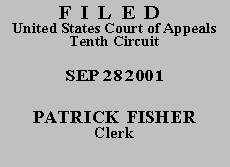

| BOYD G. PERRY; JEANNE PERRY
GILBERT; LOYD DALE PERRY;
W.D. PERRY; D. CASEY PERRY;
J.L. PERRY,
Plaintiffs, and RICHARD H. PERRY, Plaintiff-Appellant, v. LOWELL STOUT, Attorney for Cities Service; GLEN L. HOUSTON; BARRY CRUTCHFIELD; OXY USA, INC., formerly known as Cities Service Oil Company; THE ESTATE OF N. RANDOLF REESE, Defendants-Appellees. |
|
Plaintiff Richard H. Perry, proceeding pro se, appeals from an order of the district court(1) granting defendants' motions for summary judgment. We affirm.
This case has a long history dating back to 1976 when Mr. Perry's father, Henry Perry, sued defendant(2) and others, for negligently disposing of salt water, a byproduct of oil drilling near the Perry farm, with resulting contamination of the farmland. Henry gave power of attorney to his son, D. Casey Perry, who agreed to settle the case for $59,000.00. The district court dismissed the case in 1981, and released defendants from any other liabilities. Mr. Perry was dissatisfied with the settlement and obtained a general power of attorney from his father, revoking the one previously conveyed to Casey. He then filed a motion to set aside the judgment. That motion was denied and all appeals were denied.
In May 2000, Mr. Perry brought this action in federal district court on behalf of himself and his siblings. He named as defendants OXY USA, Inc. as well as the company's former attorney, two of the Perry's former attorneys, and the estate of the presiding state court judge, who is now deceased. In his complaint, Mr. Perry alleged plaintiffs' rights under 42 U.S.C. §§ 1983 and 1985 had been violated as defendants had conspired to commit fraud and "gross malpractice" in the state court case. He further asserted that Casey lacked authority to settle the case because his signature had been forged on the power of attorney form.
The district court granted summary judgment to defendants holding that the action was barred by the statute of limitations. The court also concluded that the statute of limitations could not be tolled by casting plaintiffs' allegations as constituting a continuing violation.
On appeal, Mr. Perry argues that the magistrate judge prematurely dismissed the complaint without investigating his allegations that the state court order was void due to fraud. He also contends the magistrate judge had no authority to issue the judgment without obtaining his consent to proceed before her pursuant to § 636(c)(1). He claims that the consent document purporting to contain his signature was forged and was pulled from the court files so he could not discover that fact. He further claims violations of the Clean Water Act.
We initially directed the parties to address the issue of who was the proper party on appeal to this court. The notice of appeal was signed by Richard H. Perry and states that "the Plaintiff Richard H. Perry, Pro se, hereinafter referred to as the (Perrys) . . . gives notice that they are appealing . . . ." R. Vol. II, tab 54. Non-attorney pro se litigants cannot represent other pro se parties. See 28 U.S.C. § 1654 ("parties may plead and conduct their own cases personally or by counsel"); 10th Cir. R. 3.1 (notice of appeal must be signed by appellant, if he is proceeding pro se). Mr. Perry, therefore, is the sole appellant.
"We review the court's grant of summary judgment de novo, applying the same legal standard used by the district court." Simms v. Okla. ex rel. Dep't of Mental Health & Substance Abuse Servs., 165 F.3d 1321, 1326 (10th Cir. 1999). We review de novo the dismissal of plaintiff's claims for lack of subject matter jurisdiction due to the statute of limitations. See Dahn v. United States, 127 F.3d 1249, 1252 (10th Cir. 1997).
Mr. Perry contends that the document purporting to contain his signature consenting to have this case determined by the magistrate judge is forged. Mr. Perry did not raise this argument to the district court. Therefore, it is waived. See Griego v. Padilla (In re Griego), 64 F.3d 580, 583 (10th Cir. 1995) (magistrate judge's lack of statutory authority not a jurisdictional defect; objection to such authority waived if untimely). Further, Mr. Perry received ample evidence the case had been submitted to a magistrate judge for disposition. He did not contest that action until the magistrate judge ruled against him. Mr. Perry's self-serving statements are unavailing.
Mr. Perry also argues the Clean Water Act provided the district court jurisdiction over this case. He did not raise this issue to the district court and therefore, it is waived. See Thompson v. United States, 223 F.3d 1206, 1211 (10th Cir. 2000).
The district court ruled that Mr. Perry's complaint was barred by New Mexico's three-year statute of limitations for personal injury actions. See N.M. Stat. Ann. § 37-1-8; Wilson v. Garcia, 471 U.S. 261, 280 (1985). We agree and AFFIRM the judgment of the United States District Court for the District of New Mexico on this issue for substantially the reasons set forth in the magistrate judge's order of September 11, 2000. Further, no tolling statute applies. Mr. Perry's outstanding motions are DENIED. The mandate shall issue forthwith.
Entered for the Court
Senior Circuit Judge
*. This order and judgment is not binding precedent, except under the doctrines of law of the case, res judicata, and collateral estoppel. The court generally disfavors the citation of orders and judgments; nevertheless, an order and judgment may be cited under the terms and conditions of 10th Cir. R. 36.3.
1. This case was submitted to the magistrate judge who entered final judgment pursuant to 28 U.S.C. § 636(c)(1). But see, infra pp. 4-5.
2. OXY USA, Inc. is the corporate successor, through merger, to Cities Service Oil Co., the party sued in the state court proceedings.